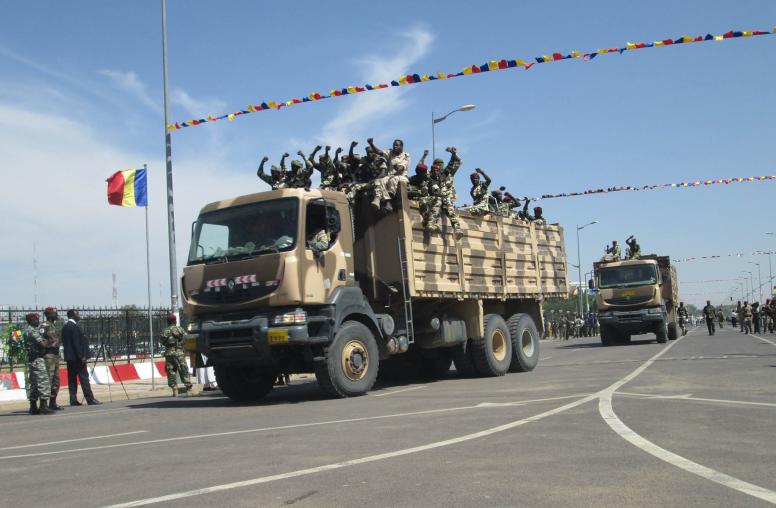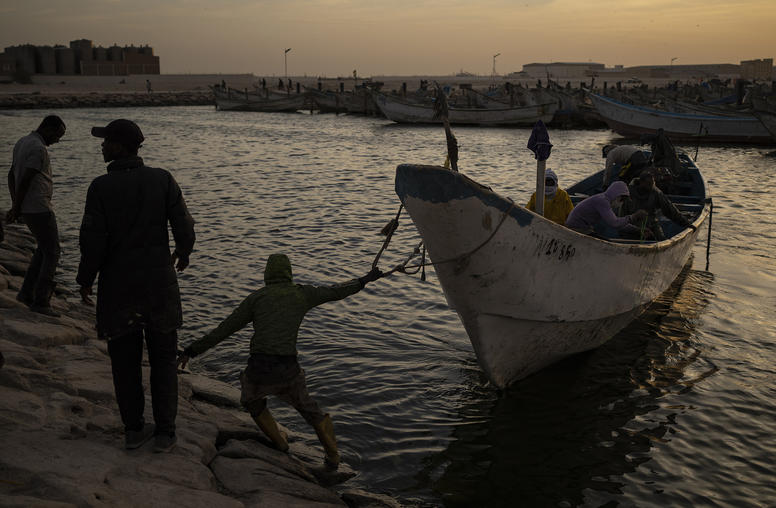The U.S. Role in Furthering Chad’s Democratic Transition
Chad’s transition is at a precarious juncture. But the United States has the diplomatic standing and resources to get it back on track.
When Chadian leader Mahamat Idriss Déby announced in October that the country’s transition period would be extended another 24 months, demonstrators took to the streets in protest, where they were met with violent repression from Chadian security forces. As the dust settled, Chadian authorities initially disclosed 50 people had been killed — but opposition groups and independent observers claim a much higher figure.

Less than two months after this incident, Déby traveled to Washington, D.C., with several other Chadian leaders to participate in the U.S.-Africa Leaders Summit. Amid demands for justice over the October 20 violence and concerns over the state of Chad’s democratic transition, Déby’s invite to the summit was not without controversy. But the longstanding U.S.-Chad relationship, as well as progress made at the summit itself, gives U.S. leadership a clear opportunity to push for accountability, to support the successful completion of the transition and to promote social cohesion amid the highly polarized political climate in Chad.
A Tenuous Political Transition
When Chad’s longtime President Idriss Déby was killed in combat in April 2021, the army took control and installed a Transitional Military Council (TMC) led by Gen. Mahamat Idriss Déby, one of the sons of the deceased president.
The TMC originally laid out plans for an 18-month transition back to civilian rule. As the deadline for that transition loomed this fall, the TMC finally managed to convene a much-delayed national dialogue that was intended to set the stage for constitutional reform and national elections.
The national dialogue did recommend a constitutional referendum including the possibility to choose the form of government. However, other important issues remained unaddressed, including the prospect of future elections. Meanwhile, several key actors from the civil society, political and military groups declined to join the dialogue or left midway, and its two most controversial outcomes — a 24-month extension of the transition and the decision that members of the TMC would be eligible to run in future elections — have only exacerbated tensions in Chad.
Dissatisfied with some of the outcomes of the national dialogue, civil society and the opposition called for mass protests on October 20, drawing thousands into the streets. The government response was swift and brutal, leaving dozens dead and hundreds injured while provoking international rebuke.
For its part, the government claims that its responses were justified after protesters engaged in looting and continued to convene even after the protests had been declared illegal. After initially arresting more than 600 people, the government released some of the protestors before transferring the remaining 401 to the remote Koro Toro prison for a hasty four-day trial that the Chadian Bar Association criticized as a “parody of justice.”
The government of Chad and the opposition have agreed about the need for an official inquiry into the October 20 incident. However, the government initially preferred to handle the inquiry within Chad while the opposition called for an independent, international investigation.
Ultimately, the government agreed to an international inquiry. And on December 14, members of an international commission arrived in Chad for 10 days of consultations. The commission is headed by the Economic Community of Central African States (ECCAS) and is meant to include representatives from the United Nations, the African Union, and the Community of Sahel-Saharan States.
The violence on October 20, the subsequent hasty trials of those detained, and the polarization over the inquiry process have disrupted the already narrow avenues for discussion between the conflicting parties in Chad, thus complicating the prospects for national reconciliation and a return to constitutional order. Moreover, transitional authorities’ hardening tone raises fears of a democratic backslide. Currently, Chad is in a political stalemate that could be reduced to a staged electoral process and a human rights rollback.
The United States as a Credible International Partner
While Chad’s 2021 succession of power didn’t involve the military overthrowing a sitting president, it was widely deemed unconstitutional from the start. Despite this, the African Union, France and other regional and international actors still have not sanctioned the leaders of Chad’s transition — a decision that stands in contrast with their positions on recent unconstitutional transfers of power elsewhere in the Sahel and West Africa, such as those in Burkina Faso, Mali and Guinea. This failure to formally sanction Chad has left the international community, and the African Union in particular, with no clear path forward.
The United States, on the other hand, has been consistent in calling for the TMC to respect the transition timetable and for TMC leaders to be deemed ineligible to run in future elections. After the bloody events of October 20, the U.S. embassy also condemned the disproportionate use of force by government security forces.
As a result, the United States is seen as one of the most credible international actors in the eyes of Chadian society. The United States is among the most critical partners of Chad and should use its diplomatic weight to compel transitional authorities to respect human rights and the transitional timeline. To seize this opportunity, the United States has three levers it can use to support a peaceful and democratic political transition in Chad:
1. Direct diplomatic engagement with the Chadian government and opposition.
It is essential to continue to discuss the need to reopen the political space with the transitional authorities. In the same sense, it is crucial for the United States to engage with the opposition parties, notably the leading opposition party Les Transformateurs (the Transformers), about reengaging in dialogue.
The announcement of the $75 million African Democratic and Political Transitions (ADAPT) initiative at the conclusion of the U.S.-Africa Leaders Summit presents an opportunity for the United States to invest a portion of the initiative’s anticipated funding in Chad, particularly toward the anticipated 2024 elections, while ensuring that any assistance to the Chadian government is directly tied to concrete steps towards greater transparency, openness of the civic space and inclusion.
2. Accountability for the October 20 violence.
Justice for the incident is important for the country's return to peace. It is crucial for the United States to support the ECCAS-led commission and any other independent, international initiatives that investigate the events of October 20 and identify those responsible. This could, for example, take the form of diplomatic support — such as the effective participation of the United Nations and the African Union in the investigation. In addition, the U.S. government could offer technical assistance to ensure that the investigation meets the standards required for such action. Finally, this support could possibly be financial if standards of transparency and impartiality are met. The United States should also use its diplomatic leverage to encourage the Chadian authorities respect the findings of the commission.
3. U.S. support for Chadian civil society and others as they promote peace and human rights.
It’s important that Chadians are given the chance to forge their own future and make their own voices heard. The United States can support this through local initiatives that work toward social cohesion and reconciliation, the defense of human rights and fundamental freedoms, and raising awareness of peaceful citizenship.
This should take the form of more substantial support for civil society organizations (including women's and youth organizations), media organizations, human rights organizations, research, and cultural exchanges. Here again, funds invested from the newly announced ADAPT initiative can help to make Chadian civil society a bastion against democratic backsliding. Other U.S. institutions that are already active in supporting Chad or planning to support the country could also be urged to support these civil society actors with a view toward strengthening democracy in the country. As a last resort, in the face of continued radicalization from the transitional authorities, direct and targeted political and economic pressure could allow for an opening of the political space.
Dr. Yamingué Bétinbaye, Allah-Kauis Neneck and Babouh Tih-Kwada Elisabeth are researchers at the Center for Research in Anthropology and Human Sciences (CRASH), a think-tank based in N’Djamena, Chad.
Dr. Hoinathy Remadji is a member of the scientific board at CRASH.



